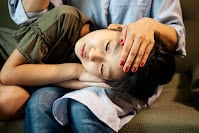Youth With Migraines Twice as Likely to Have Anxiety, Depression

Children and adolescents who get migraines may have a greater risk of experiencing anxiety and depressive symptoms and disorders compared with their peers who do not get migraines, according to a report published in JAMA Pediatrics.
“The association between migraine and anxiety and depressive symptoms and disorders is likely bidirectional and multifactorial,” wrote Katherine Falla, M.D., of the University of Calgary and colleagues. “The experience of pain and internalizing symptoms may result in mutually reinforcing behaviors, such as reduced sleep and withdrawal from activities, and mutually reinforcing cognitive patterns, such as negativity bias and attention bias.”
Falla and colleagues conducted a systematic review of case-control, cohort, and cross-sectional studies that assessed the association between internalizing symptoms and/or disorders and experiences of migraines in children and adolescents 18 years or younger. They searched MEDLINE, Embase, PsycINFO, and CINAHL databases for studies that assessed symptoms and disorders on the spectrum of anxiety disorders, depressive disorders, and trauma- and stressor-related disorders, as defined in DSM-5. The authors reviewed 80 studies, and 51 included data that were able to be pooled in a meta-analysis.
Anxiety and depressive symptoms were significantly higher in children and adolescents who had migraines compared with controls. Further, youth who experienced migraines were about twice as likely to have an anxiety or depressive disorder compared with those without migraines. In studies that compared children and adolescents who experienced migraines with those who had other headache disorders (tension-type headaches, new daily persistent headaches), no significant differences emerged for internalizing symptoms between the two groups.
Three studies assessed the longitudinal association between anxiety and depressive symptoms and migraine outcomes, and these found that higher anxiety and depressive symptoms were associated with higher headache frequencies at follow up, which ranged from one to four months.
This study “is one more piece of evidence supporting our need to address and improve mental health care for youth,” wrote Jessica Hauser Chatterjee, M.D., Ph.D., and Heidi Blume, M.D., M.P.H., of the Seattle Children’s Research Institute in an accompanying commentary. “It is likely that youth with migraine are particularly vulnerable to experiencing significant adverse effects and poor outcomes related to mental health disorders, but more work is needed to investigate these associations. There needs to be a radical evolution in how the medical and governmental systems support mental health of youth with migraine, other headache syndromes, neurological disorders, and other chronic health problems.”
For related information, see the Psychiatric News article “Psychiatrists Have a Role in Managing Pediatric Pain.”
(Image:iStock/kokouu)
Don't miss out! To learn about newly posted articles in Psychiatric News, please sign up here.






